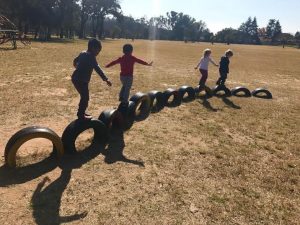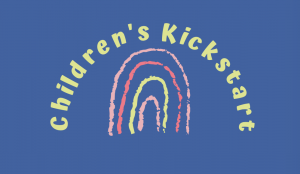By Julia Gorham
“Children need the freedom and time to play. Play is not a luxury. Play is a necessity.” Kay Redfield Jamison.
Play is the most valuable way that that children learn. Play allows children to use their creativity while developing their imagination, dexterity, and physical, cognitive, and emotional strength. Play is important to healthy brain development. It is through play that children at a very early age engage and interact in the world around them.
Maria Montessori stated “The hands are the instrument of a man’s intelligence.” This statement recognizes the tremendous importance to a young child of having exciting objects to hold and listen to and feel and manipulate. And, as young children struggle to create a desired effect with a toy, they discover that it isn’t always easy. They realize that there is perhaps a problem to be solved and that they have to practice to acquire and improve the skills necessary to achieve their goal.
 Studies have proven that play with other children is also critical for the development of children’s social skills too. They are developing skills and habits and attitudes that will stay with them throughout their lives. Play is children’s work, and they give a tremendous amount of energy and effort to it. It promotes the facets of emotional well being learning awareness, acceptance, personals integration, coping skills and building values including empathy, trust and respect for others while they play.
Studies have proven that play with other children is also critical for the development of children’s social skills too. They are developing skills and habits and attitudes that will stay with them throughout their lives. Play is children’s work, and they give a tremendous amount of energy and effort to it. It promotes the facets of emotional well being learning awareness, acceptance, personals integration, coping skills and building values including empathy, trust and respect for others while they play.
Play stimulates a child’s perceptual motor development with eye-hand co-ordination, where they learn to manipulate objects, locomotive skills, learning to jump, hop, climb etc. learning to control their bodies.
Play promotes the aspects of the child’s intellectual development with problem solving skills, initiation and memory, concept formation and association and classification.
 Play develops language skills that forms the basis of the child’s language which include receptive, expressive non-verbal and auditory memory and discrimination skills.
Play develops language skills that forms the basis of the child’s language which include receptive, expressive non-verbal and auditory memory and discrimination skills.
Different types of play can also include manipulative play where children use their small muscles to build something, play with educational toys, sensory play involving touch and feel with different mediums, water play which is a calming activity, sand and water play and creative play in the form of art.
Play is vital for the child’s total development for the very reason that it is the most important way that a child learns. No activity is as valuable to the young child.
As parents, we must not underestimate the value of play for young children.
So let your child learn, have fun and play, play, play!
By Julia Gorham.




